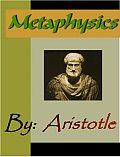
The following selections are from http://www.formalontology.it/being-qua-being.htm
"What were Aristotle's metaphysical contentions, and what is Aristotle's Metaphysics? The latter question is the easier. The work, as . we now have it, divides into fourteen books of unequal length and complexity. Book Alpha is introductory: it articulates the notion of a science of the first principles or causes of things, and it offers a partial history of the subject. The second book, known as "Little Alpha," is a second introduction, largely methodological in content. Book Beta is a long sequence of puzzles or aporiai+: possible answers are lightly sketched, but the book is programmatic rather than definitive. Book Gamma appears to start on the subject itself: it characterizes something which it calls "the science of being qua being" -- and it then engages in a discussion of the principle of non-contradiction. Next, in book Delta, comes Aristotle's "philosophical lexicon": some forty philosophical terms are explained and their different senses shortly set out and illustrated. Book Epsilon is brief: it returns to the science of being qua being, and also passes some remarks on truth.
Books Zeta, Eta and Theta hang together, and together they form the core of the Metaphysics. Their general topic is substance: its identification, its relation to matter and form, to actuality and to potentiality, to change and generation. The argument is tortuous in the extreme, and it is far from clear what Aristotle's final views on the subject are -- if indeed he had any final views. The following book, Iota, concerns itself with the notions of unity ('oneness') and identity. Book Kappa consists of a resumé of Gamma, Delta, and Epsilon and of parts of the Physics. In book Lambda, we return to the study of beings and of first principles: the book contains Aristotle's theology, his account of the 'unmoved movers', which are in some sense the supreme entities in his universe. Finally, Books XIII and XIV turn to the philosophy of mathematics, discussing in particular the ontological status of numbers."
---From: Jonathan Barnes (ed.) - Cambridge Companion to Aristotle - Cambridge, Cambridge University Press 1995.Chapter 3 - Metaphysics - by Jonathan Barnes - pp. 66-67.
"Aristotle can fairly be said to be the founder of metaphysics as a separate discipline, as well as one of the most influential theorists of metaphysics. (...) Aristotle was not the first philosopher to concern himself with metaphysical issues, but he was the first to study metaphysics systematically and to lay out a rigorous account of ontology. (...) In the Metaphysics Aristotle subjects to scrutiny his own metaphysical principles. Our word 'metaphysics' itself derives form the expedient of early editors of Aristotle who, not knowing what to call his books on first principles, called them META TA PHYSIKA, the material after the physical enquiries. Whether the fourteenth books of the Metaphysics are a unity or a collection of disparate treatises is a matter of serious debate. Aristotle clearly recognizes a special study corresponding to metaphysics which he calls variously wisdom, first philosophy, and theology.
But the books of the Metaphysics seem to present different conception of what metaphysics is. In Book I Aristotle identifies wisdom with knowledge of the ultimate causes and principles, which he identifies as the four causes. Book IV makes metaphysics an enquiry into the causes of being qua being, an enquiry made possible by the fact that all senses of being are related to a single central notion, the notion of substance. Book VI argues that the highest science must study the highest genus of substance, which is the divine, and hence this science must be theology. Of course, it is not surprising that metaphysics should take in studies of causation, of ontology (the study of the basic entities in the world), and what was later called special metaphysics (the study of special kinds of beings, e.g. God and the soul); but precisely how these enquiries were related in Aristotle's mind remain obscure."
From: Hans Burkhardt & Barry Smith (eds.) Handbook of Metaphysics and Ontology - Philosophia Verlag GMBH - Munchen 1991 - Aristotle - by Daniel W. Graham - in: vol. I - pp. 50-52

No comments:
Post a Comment